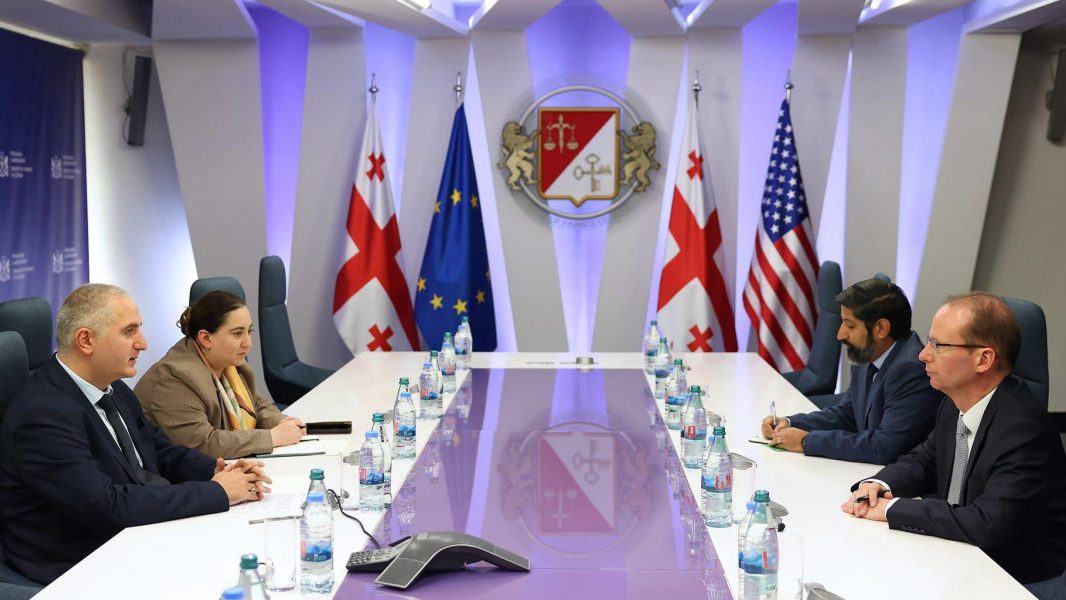Qarabağ FK host Newcastle in Champions League playoff tie
Qarabağ FK will face Newcastle United in the UEFA Champions League play-off round on Wednesday evening in Baku, in what will be the first UEFA compet...

Acting U.S. Ambassador Alan Purcell met with Georgia’s Finance Minister Lasha Khutsishvili to discuss economic ties, sanctions, and Georgia’s potential role in the U.S. TRIPP regional initiative.According to the U.S. Embassy in Tbilisi, the discussion touched on Georgia’s economic development, U.S.
According to the U.S. Embassy in Tbilisi, the discussion touched on Georgia’s economic development, U.S. sanctions on Russia, and emerging opportunities for Georgia within the rapidly evolving South Caucasus connectivity landscape.
Why This Meeting Matters: Georgia’s Strategic Transit Role Is Shifting
For decades, Georgia has been a key transit corridor between Europe and Asia, central to the Middle Corridor—the trade route stretching from Central Asia through the South Caucasus towards Europe. But the geopolitical map of the region is quickly changing.
The TRIPP corridor, launched after a U.S.-brokered agreement between Armenia and Azerbaijan, aims to:
For Georgia, this development presents both opportunities and risks.
Could TRIPP Strengthen or Sideline Georgia?
Potential Benefits
If Georgia aligns with the TRIPP initiative, experts note several possible advantages:
Georgia could position itself as an auxiliary or complementary hub, ensuring it remains a vital link in regional supply chains.
Potential Challenges
However, TRIPP also introduces competitive pressure:
Washington Highlights Georgia’s Critical Role in the Middle Corridor
Earlier, on 21 November, speaking at the Black Sea Platform conference organised by the EU–Georgia Business Council, Purcell stressed that Georgia remains indispensable to the Middle Corridor—the evolving trans-Eurasian route linking Central Asia with European and global markets.
He underscored long-standing U.S. support, pointing to significant U.S. Development Finance Corporation (DFC) investments in the New Poti Sea Port, aimed at boosting capacity, improving logistics, and enhancing the Middle Corridor’s competitiveness as an alternative to routes passing through Russia.
Purcell added that American companies increasingly view Georgia as a promising hub in sectors such as:
According to the Chargé, the Middle Corridor is not just a route—it is a driver of regional cooperation, innovation, and economic growth across the South Caucasus and the Black Sea basin.
Sanctions, Stability, and the Bigger Picture
The U.S. continues to urge Georgia to strengthen compliance with sanctions on Russia, an issue tied closely to the economic and security environment in the region. As Western involvement in the South Caucasus grows, Washington wants reliable partners capable of transparent trade practices, secure transport routes, and predictable regulatory environments.
Today’s meeting signals that the U.S. sees Georgia as an important player—but also one that must actively position itself in new regional realities.
What Comes Next?
Georgia has not yet formally joined TRIPP, but the door appears open. The next steps may involve:
For now, Tbilisi faces a strategic choice: adapt to the region’s new connectivity map, or risk becoming a bystander as its neighbours reshape the flow of goods, investment, and influence.
What is clear is that Washington’s interest is growing—and Georgia’s response will shape its economic future.
Cuba’s fuel crisis has turned into a waste crisis, with rubbish piling up on most street corners in Havana as many collection trucks lack enough petrol to operate.
Iran’s Revolutionary Guards navy held military exercises in the Strait of Hormuz on Monday (16 February), state-linked media reported. The drill took place a day before renewed nuclear negotiations between Tehran and Washington in Geneva.
Ruben Vardanyan has been sentenced to 20 years in prison by the Baku Military Court after being found guilty of a series of offences including war crimes, terrorism and crimes against humanity.
Canadian Prime Minister, Mark Carney, announced on 16 February that the Honourable Janice Charette has been appointed as the next Chief Trade Negotiator to the United States. She's been tasked with overseeing the upcoming review of the Canada-United States-Mexico Agreement (CUSMA).
The Pentagon has threatened to designate artificial intelligence firm Anthropic as a “supply chain risk” amid a dispute over the military use of its Claude AI model, according to a report published Monday.
The United Nations Development Programme (UNDP) has warned that clearing the vast of rubble in Gaza could take up to seven years at the current pace, as the overwhelming majority of residents continue to live in what it describes as extremely dangerous conditions.
Kyrgyzstan faces a critical political turning point as elite splits and public protests highlight deep divisions in Bishkek. Analysts warn that President Japarov’s dismissal of a top ally could shift the balance of power and threaten Kyrgyzstan’s political stability.
Tehran’s right to develop and use nuclear energy for peaceful purposes is “inherent, inalienable, and non‑negotiable,” Iranian Foreign Minister, Abbas Araghchi, told the high-level segment of the United Nations Conference on Disarmament in Geneva on Tuesday (17 February).
Georgia’s ruling party, Georgian Dream, is moving to criminalise what it calls “extremism against the constitutional order”, introducing a new article to the Criminal Code that could lead to prison sentences of up to three years.
For many Palestinians, the holy month of Ramadan is being observed amid hunger, displacement and uncertainty. Families are relying on humanitarian aid to uphold faith and dignity, even as violence, poverty and restrictions shape daily life.
You can download the AnewZ application from Play Store and the App Store.

What is your opinion on this topic?
Leave the first comment